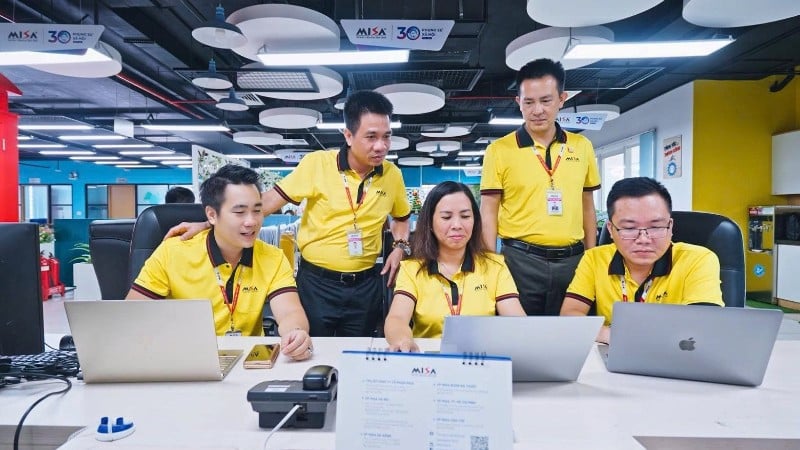
Not only businesses need to train and rearrange their human resources, but training facilities and management agencies also need to change the way they prepare resources. Without timely policies and synchronous approaches, the human resource problem will leave many social consequences. .
Artificial intelligence, digitalization, and automation are creating shifting pressures on the workforce. Many businesses are forced to train and upgrade skills for existing employees instead of recruiting new ones to retain workers in the digital environment. This is not only a solution to retain employees, but also a strategy to improve the quality of resources in the long term.
Open up new job positions
As a pharmaceutical company with a long history, operating mainly based on human resources and direct distribution channels, Traphaco Joint Stock Company is not outside the digital transformation trend.
Artificial intelligence, digitization, and automation are creating shifting pressures on the workforce. Many businesses are forced to train and upgrade skills for existing employees instead of recruiting new ones to retain workers in the digital environment.
Mr. Nguyen Huy Van, Deputy General Director of Traphaco Joint Stock Company, said that the biggest change took place in the accounting and branch operations department. Previously, each branch had at least one accountant, but since the company established the Electronic Order Processing Center and applied invoice management technology, the company has reduced about 100 accountants and one accountant now manages up to 28 branches.
At the company's pharmaceutical factory in Hung Yen , with the introduction of high technology, from nearly 130 workers, there are now only about 65 workers, but productivity has increased 3 times. The company also implemented a long-term adaptive human resource strategy, which is to classify positions that can be replaced by technology to develop plans for retraining, upgrading skills or transferring personnel to new positions.
Mr. Nguyen Huy Van shared that the company's principle is not to push workers out of society because they have been with the company for many years and consider digital transformation an opportunity to upgrade the quality of human resources, creating conditions for workers to develop skills suitable for new trends.
ThaiBinh Seed Group Joint Stock Company used to be known for its team of purely agricultural engineers, but now, in addition to the seed testing team, the company is recruiting more data processing staff and programmers to analyze seeds on the computer system.
The company representative shared that researchers today must know how to read genetic data, combined with computer tools to speed up the research process and quickly bring products to market.
Similarly, a representative of Sao Thai Duong Joint Stock Company said that the company's biggest current need is for personnel capable of interdisciplinary research such as biotechnology-pharmaceuticals-applied chemistry, and at the same time, can coordinate with artificial intelligence (AI) in testing to produce highly competitive products on the market.
It can be seen that science and technology are creating comprehensive changes in the workforce in enterprises. From the practice of deploying technology solutions for more than 350,000 customers who are agencies, enterprises, and individual business households, Mr. Le Hong Quang - General Director of MISA Joint Stock Company said that in the context of strong digital transformation, many enterprises around the world, including Vietnamese enterprises, have had clear changes in the way of reorganizing the workforce according to some main trends:
First, focus on training to improve employees’ ability to apply AI to work. Instead of recruiting new employees, businesses choose to invest in internal training to retain talent and maintain organizational culture.
Second, restructuring the organization towards a leaner and more flexible direction to speed up decision making and improve team performance. On the other hand, training personnel to apply technology and especially apply AI to business operations has helped eliminate many repetitive and time-consuming manual tasks.
According to Mr. Nguyen Phu Hung, Director of the Department of Science, Technology and Engineering (Ministry of Science and Technology), the labor market will have to restructure and shift from simple labor to knowledge-based labor and digital skills is an irreversible trend. This trend will create new jobs in strategic technology fields such as: Automatic production line operation, data analysis, software development, robot control, digital product design.
Pressure to adapt
According to the assessment of the Ministry of Science and Technology, automation technology and AI are gradually replacing simple repetitive jobs, leading to an increase in skills gaps and the risk of job loss. The unskilled, elderly, untrained or digitally skilled workforce is easily left behind; there is a risk of labor differentiation between the digital-intellectual workforce and the traditional workforce. Without timely training and retraining policies, older, less educated or rural workers are easily eliminated. This is a major challenge to the goal of inclusive development and requires smart regulatory policies.
In fact, with the strong development of technology, many banks have had to cut staff in unnecessary positions, while they still have to recruit new staff in the fields of information technology, data, digitalization, AI, etc. According to experts in the banking sector, the number of traditional transaction offices is expected to gradually decrease, making way for transaction activities in the digital space. At the same time, AI will replace humans in many stages.
Technology experts say that many traditional professions such as data entry, cashier, accounting, customer service, graphic design, content marketing, etc. are at high risk of being replaced by AI and automation. The root cause is that training has not caught up with the market and there is a lack of strong policies to retrain unskilled workers.
Some technology solution providers for businesses also predict that when new technology solutions such as AI are widely deployed in businesses, the workforce will have profound changes in roles, working methods and skill requirements.
However, by replacing humans, technology opens up opportunities for a positive shift from manual labor to higher value-added, more strategic labor.
That change is clearly reflected in the choice of majors of students at training institutions.
Professor, Dr. Hoang Xuan Thao, Head of the Faculty of Information Technology, Hanoi University of Business and Technology (HUBT), said that digital technology-related majors such as AI, data science, programming, cyber security, e-commerce or digital business are becoming prominent choices for students. On the contrary, many traditional majors such as office administration, accounting or economic law have recorded a downward trend in registration.
It can be seen that technology is opening up unprecedented opportunities for businesses and the economy, but also poses an urgent problem of human resource transition.
(To be continued)
Source: https://nhandan.vn/bai-1-cong-nghe-tai-dinh-hinh-luc-luong-lao-dong-post896269.html


































































































Comment (0)